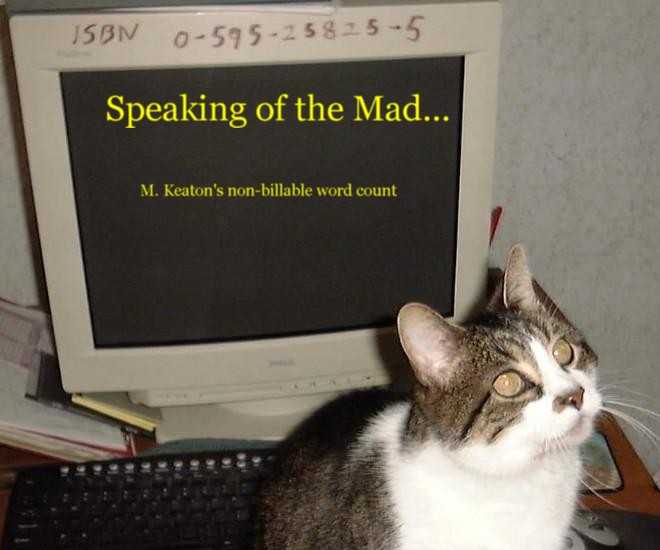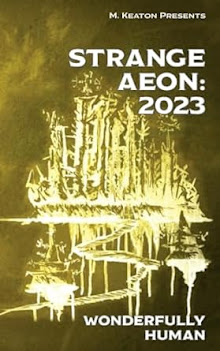I finally mewed at the Thin Man until he agreed to explain, at least in brief, his philosophy of the soul and why animals do go to heaven. Because it is pedantic and of little interest to the reader (in his opinion) he wants me to spread it out (I’m thinking of instituting ‘TheoTuesdays’ like the current ‘ConspiriThursday’) and he insists on the following disclaimer:
There are public theologies and private thoughts. Likewise, there are core, vital doctrines and then there are those speculations that are not truly relevant in the grand scheme of Salvation. This is a private speculation based largely on two foundations: the fact that it seems intuitively correct and does not contradict anything extant in the Holy Writ; and a reasoned extension of the already-displayed character and consistency of God documented in the Holy Writ. These are one man’s thoughts in the long hours of the night and should not be considered in any way worthwhile doctrine or even subjects of debate (except, perhaps, where the reader may find the Holy Ghost prompting within—and at that point it is an issue between God and the reader).
A Brief Discourse on the Animistic and Anthropomorphic Extensions of the Nature of the Soul
1: The Debate of Body and Soul
The question of what, exactly, is the soul and how it relates to the other aspects which make up the totality of this mortal clay called ‘man’ is a subject of debate as old as mankind himself. The modern cliché describes man as body, spirit, and soul (sometimes substituting mind for spirit) without clearly defining the terms. Most of us accept this without question or understanding. Medieval scholars debated extensively the conflict between the body and soul with the mind or spirit absent completely from the discussion. Indeed, the concept of the spirit existing separate from the soul is a relatively new (or alternatively very old) idea. There is little question that man has a body and that he has a soul—some part of his existence that is both immortal and inextricably connected to man’s relationship with the Divine—but whether or not he also possesses a separate component of spirit or conscious mind separate from one of these two is a matter still unsettled. The apostle Paul writes about the two ‘natures’ within man, one base and human, one divine and acquired through divine grace, that exist within the believer in a constant state of dynamic struggle. This has been interpreted by scholars to show either as two spirits within man seeking influence over bodily actions and the direction of the soul or as two souls, each attempting to control the body.
The Holy Writ makes no attempt to define the soul. “And the Lord God formed man the dust of the ground and breathed into his nostrils the breath of life; and man became a living soul.” Thus is implied that the soul exists beyond death and that the body is separate from the soul but that the body, lacking the soul, is dead.
All of this goes simply to point out that, when asking the question, “What is the soul and where does it begin and end?” there is no empirical answer. The question is, I believe, something that each person must ultimately answer for themselves. St. Aquinas spent volumes discussing it and, in the end, even he did not arrive at a simple or comprehensive answer. It is most likely that the actual answer is an intuitive truth—that we know what the soul is even if we cannot succinctly articulate it. I believe that, since words have power and much of that power is the power to bind and limit, this inability to capture the soul with words, to put the divine spark of the self into a simple box, is a necessary mystery. It is right and fitting that the soul should be beyond mere words.
For our purposes, let me state what I hold as true, remembering that I am most likely wrong, definitely incomplete in my understanding, and quite possibly different from the reader. I contend that man is comprised of three elements—body, spirit, and soul—but that these distinctions are themselves misleading and that the three elements, in the mortal coil, are inextricably linked and interwoven within each other. The color of man is a plaid. The spirit and soul influence the body. Does not a man gripped by fear and despair carry himself differently from one free of cares? And over time, do not these aspects originating not of the body, in time, mold and form the body into unchanging physical forms? Likewise the body exerts its influence in turn. A man living in constant physical pain will see his spirit affected, for good or ill. The body is the aspect that the physical world and other humans interact with and this interaction, in turn, cannot fail to influence the less physical aspects of man. Let me also state that, in the course of this discussion, I shall often use the terms soul and spirit interchangeably and possibly even incorrectly. This is because of the unique mixture of the part of the human condition that make precise distinctions impossible.
Accepting then that anything I say is, at best, sophiclism, I further contend that the seat of consciousness is most likely the spirit. That is to say, the spirit and the mind occupy the same role in the human amalgama. The body—the implacable, omnipresent clay that is the seat of human existence—is an absolute, standing to the one side of the spirit. The soul—that part of man that is immortal, moral, and uniquely tuned to the divine—stands on the other. The spirit, influenced by both, is a kind of metaphysical skid brake between the two. Our concept of our selves is that worn, malleable, ever-flexing cushion between the two extremes, influenced by and filtering the effects of each, though in muted form, to the other allowing us to exist as one unified being made up of incompatible extremes.
And what, you ask, does any of this have to do with animals and heaven? I might get to that eventually; but aren’t you sorry you asked?
Subscribe to:
Post Comments (Atom)





















1 comment:
No, not sorry at all. :-) Since I too believe that there are animals in heaven, I am very interested in reading this.
I also agree with you about the mind/spirit being the point between between the body and the soul (the fulcrum), and that they are all intertwined and do influence each other.
Post a Comment